Day 881 of 1000
Answers to Homeschool Questions Series Index
A blog friend, Kendra, has asked a series of questions about how we did our homeschooling with a particular interest in how to use CLEP testing and other tools to skip high school, or at least parts of it. This is the third in the series of questions.
(1) I have the 7th grader (great reader) and 6th grader (hole digger)  I would like to have my 7th grader do Algebra in 8th grade. If that’s successful, what would be your suggested schedule for the upper grades? By that I mean, Algebra II, Geometry, etc. What order and what curriculums? We are currently using Saxon math.
I would like to have my 7th grader do Algebra in 8th grade. If that’s successful, what would be your suggested schedule for the upper grades? By that I mean, Algebra II, Geometry, etc. What order and what curriculums? We are currently using Saxon math.
One of the things on which we had agreement with our children was that they could do whatever they wanted in graduate school, but because they were still essentially of high school age during at least the first two years of college, they needed to study something hard. That meant there would be a very strong focus on mathematics. As I have mentioned in other places in the blog, Kelly is in the last semester of a degree in Statistics and Christian is in the last semester of a degree in Applied Mathematics. So, with three months left, Kelly’s grades are currently at the level to graduate Magna Cum Laude while Christian is on schedule to graduate Summa Cum Laude with an honors degree. I only said that to say that the way we did Mathematics in our homeschool appear to have been good preparation for Mathematics intensive degrees. I should note that we got great prices at Sonlight, so we bought these programs there. So here is what we did:
Singapore Math – We started with Saxon Math in elementary school. It worked well for us, but it did not create a lot of excitement with the kids, so I did research over the summer and settled on Singapore Math. We absolutely loved it. It seemed to allow the kids to learn the material faster at the same time it was more interesting to them. We did about a year and a half worth of Singapore Math each year and that did not seem to be an onerous work load for the kids. They still loved the program when we finished it at the end of the (Singapore Math) sixth grade year.
Teaching Textbooks – We tried to use the Singapore Math offering when Kelly finished up the last of the Sixth Grade books. After about a month, we gave up and looked for something else, because it was just not working. I did an investigation, found several options that looked OK and decided to take a chance on what was not a completely mature program at the time, Teaching Textbooks. It was nothing short of awesome. The kids both did Pre-Algebra, Geometry, Algebra I, Algebra II with Teaching Textbooks. We purchased the Pre-Calculus program for Kelly when she got to it, but it was very immature at the time. I have heard that it has been dramatically improved and we probably would not have changed if that program had been better at the time.
Thinkwell Math – When we knew we needed to switch from Teaching Textbooks for Pre-Calculus, I went through another investigation phase and received very good reports about Thinkwell Math. It is an online course that is absolutely excellent. Kelly went through their entire Pre-Calculus program in conjunction with the REA Pre-Calculus CLEP preparation book. She easily passed the Pre-Calculus. Christian got through almost exactly half of that course before he had to take the Community College Mathemetics placement test. That half year was enough to place him into Calculus I where he did well.
(2) What is your opinion on an 8th grader attempting biology? We are using Apologia science. We are working through their prescribed 7th grade book now. They offer an 8th grade science which looks like an Earth science type subject. I considered having my 7th grader begin the 8th grade book over summer and try to complete 8th and biology by the end of his 8th grade summer. I do realize that biology would be a grade for a HS transcript.
Like you, we used Apologia starting with Physical Science and going on to Biology both of which appeared on both Kelly’s and Christian’s high school transcripts. That was the last of their homeschool science. Kelly then spent six months going through the REA Biology CLEP preparation book and was able to pass that test with a fairly high score. Neither Christian nor Kelly had any problem with Biology in college. That being said, Christian had to do some pretty serious preparation to be able to handle Chemistry in college, but his strong Mathematics background made Physics pretty straightforward for him. Kelly did not take Chemistry or Physics in college.
(3) History – I like the history we have picked (Mystery of History) in the fact that it’s fun to read. I feel it will not prepare us adequately. What history program would you recommend? I would like something better than just a date-and-name curriculum but want the curriculum that will get the job done.
History was a little bit of a problem for us. Kelly brute forced her way through the REA CLEP preparation books to pass four CLEP history tests (Western Civilization 1 & 2 and US History 1 & 2). Christian took Western Civilization 1 and 2 at the community college and did well in them based on the preparation he got in homeschool. We think the Sonlight programs served our children very, very well in this regard with one exception. We think Sonlight’s high school US History program based on the Joy Hakim books is abysmal. We put a US History program together for ourselves that we absolutely loved. I discuss what we did here, here, here, here and here. All this being said, unless your kids are memorization machines, the CLEP History exams can be pretty rough. Kelly is a pretty gifted/disciplined memorizer, but passing all those tests was a chore and Christian really enjoyed his History at the Community College because he got a great teacher.
(4) My goal would be to try the CLEP tests with English, beginning histories, and some maths. I believe I need to start working towards that goal now.
This does not seem like a bad goal with the cavaet about the History. The REA CLEP preparation books were our friends in passing the tests.
(5) I remember you saying that a passed CLEP test gives college credit as opposed to a grade. How does that affect their college GPA? Do you know if there is an age requirement for taking the CLEPs?
Big State U (in our case North Carolina State University, but I know this to be true about the vast bulk of Univerisities in the country) gives credit but not grades for passed CLEP tests and Community College classes. I know when I started college at Big State U (Oregon State University), I was academically, but not mentally nor social prepared for college, so my grades suffered greatly the first two semesters. I spent my entire Bachelor’s degree trying to make up for those semesters. Our kids did better than me during their first too semesters, but have done dramatically better since then. The upshot is that all one has to do to get the credits for the CLEP test is to get the minimum score accepted by the University. All one has to do to earn credits for the Community College is to get high enough overall grades to get accepted at the University of choice. Anything that is a C or above gets converted to a PASS. The kids get a clean slate GPA-wise when they enter Big State U. That was a very good thing for us.
(6) Our local junior college allows students who are duel enrolled to attend tuition free – a big savings that would be a huge help. HOWEVER – if my boy(s) could pass a CLEP test I don’t see the point in them spending the time to take a class just to utilize “tuition free.”
This is a very good point. If we had this to do over we would have studied for only those CLEP tests the kids did not enjoy, so they did not have to deal with it any more. Because of our errors, we got Kelly into Community College (with a boatload of credits) after her Sophomore year of high school. We would have put her in after her eight grade year with that do-over.
I hope that helps! Loved the questions!
Betty Blonde #47 – 09/19/2008

Click here or on the image to see full size strip.


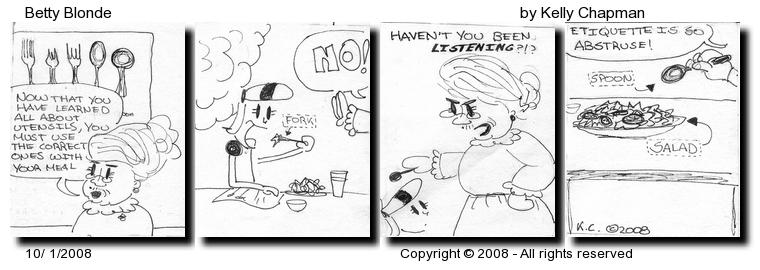
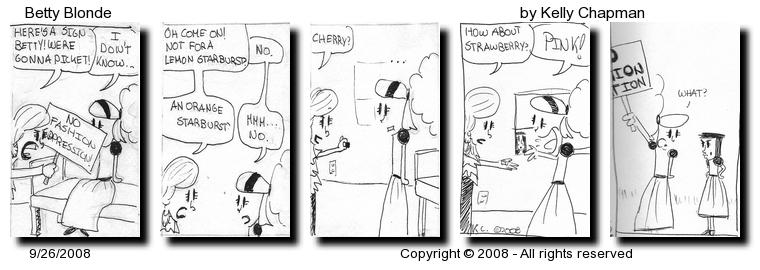
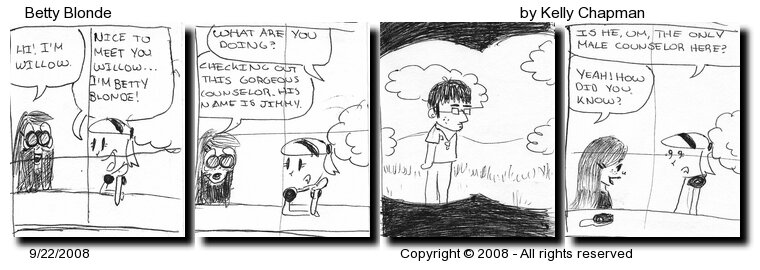
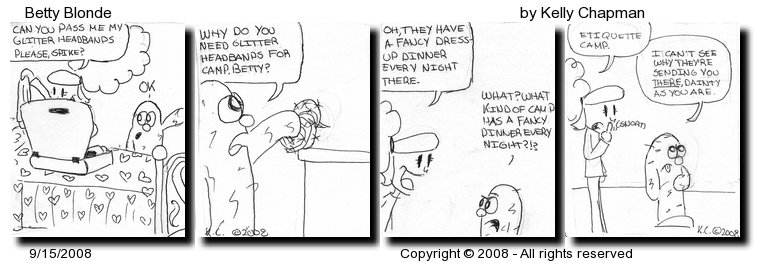
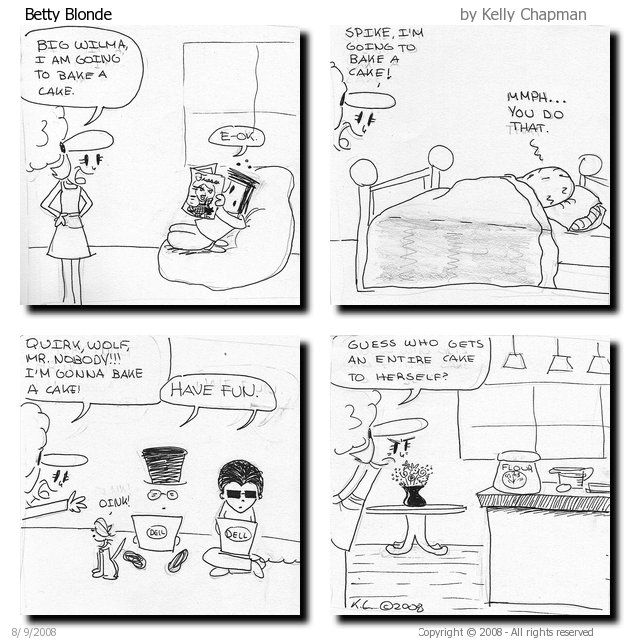
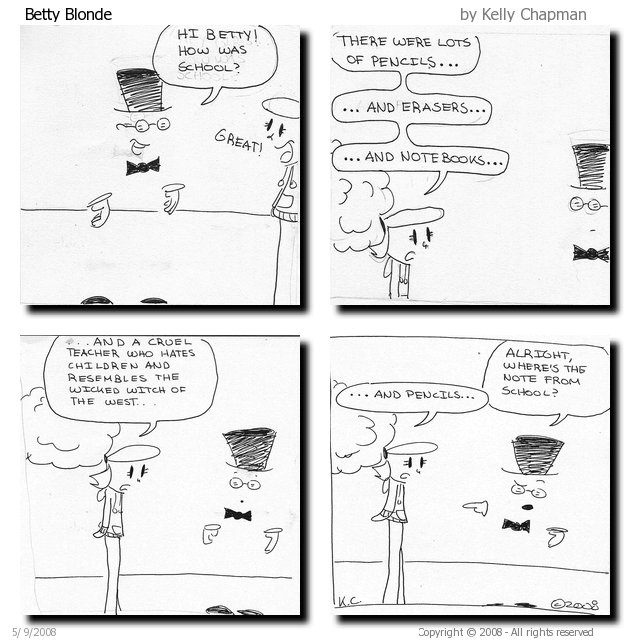
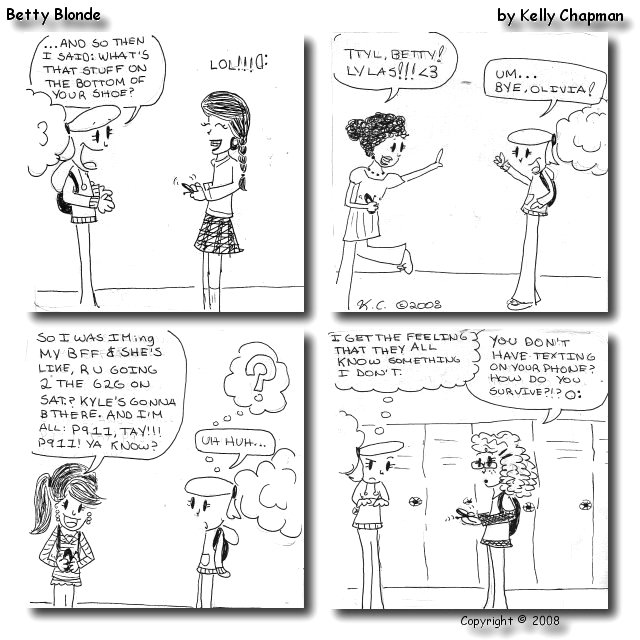
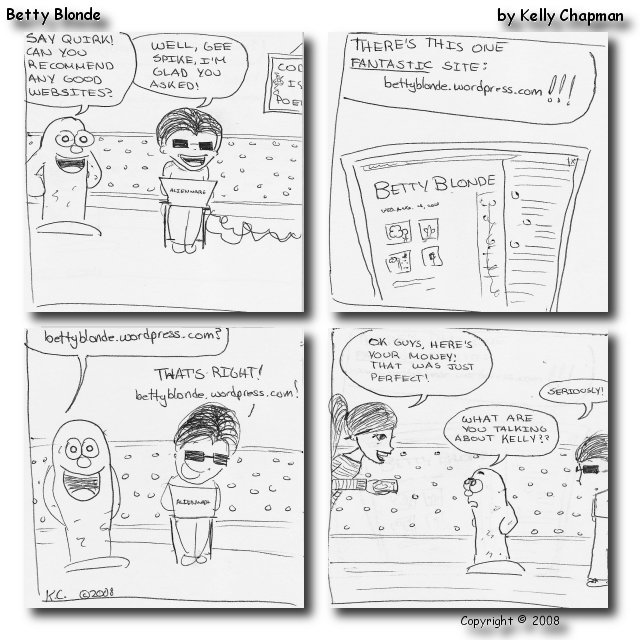
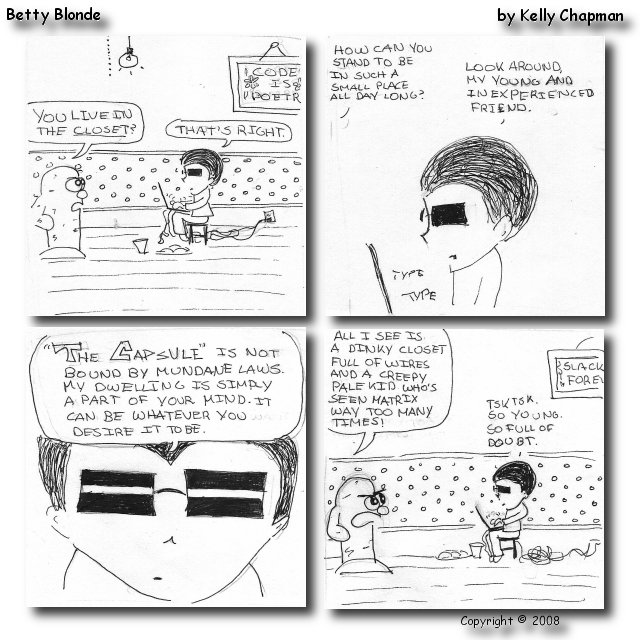
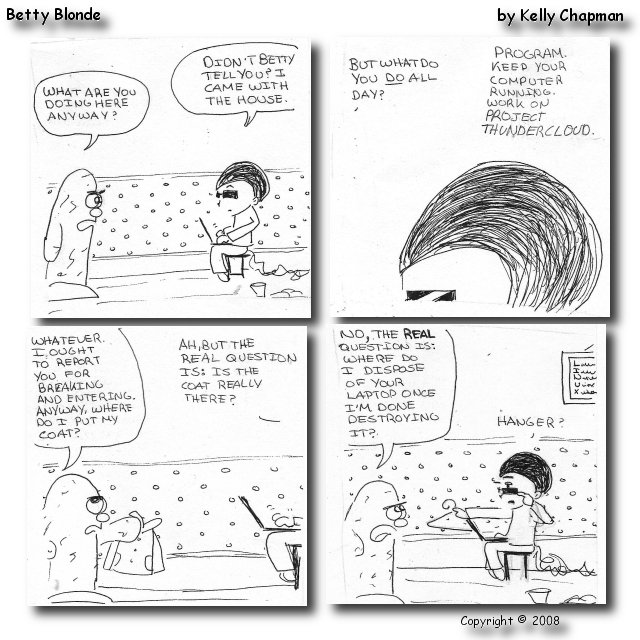


 I think this is certainly true. It is not fashionable to study the hard stuff. And the interesting thing is that there are more jobs available for people who study the “kind of” hard stuff (I imagine that means studying through Calculus, Diff Eq, and that sort of thing) than those who study the REALLY hard stuff like high level math and statistics (Real Analysis, Mathematical Statistics, and the hard proofs classes after that). Here is the quote from the article:
I think this is certainly true. It is not fashionable to study the hard stuff. And the interesting thing is that there are more jobs available for people who study the “kind of” hard stuff (I imagine that means studying through Calculus, Diff Eq, and that sort of thing) than those who study the REALLY hard stuff like high level math and statistics (Real Analysis, Mathematical Statistics, and the hard proofs classes after that). Here is the quote from the article: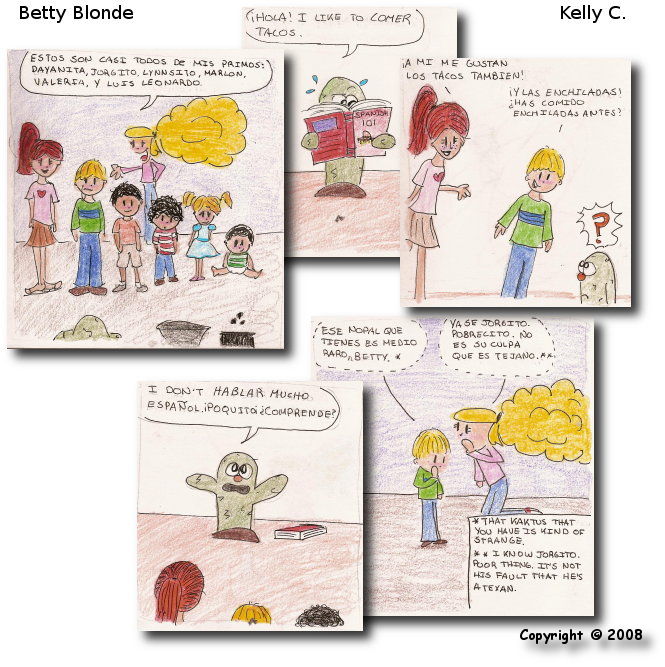
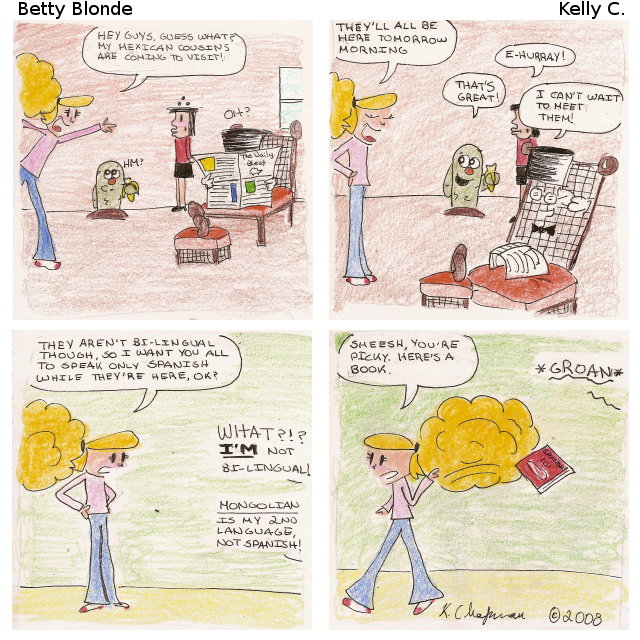



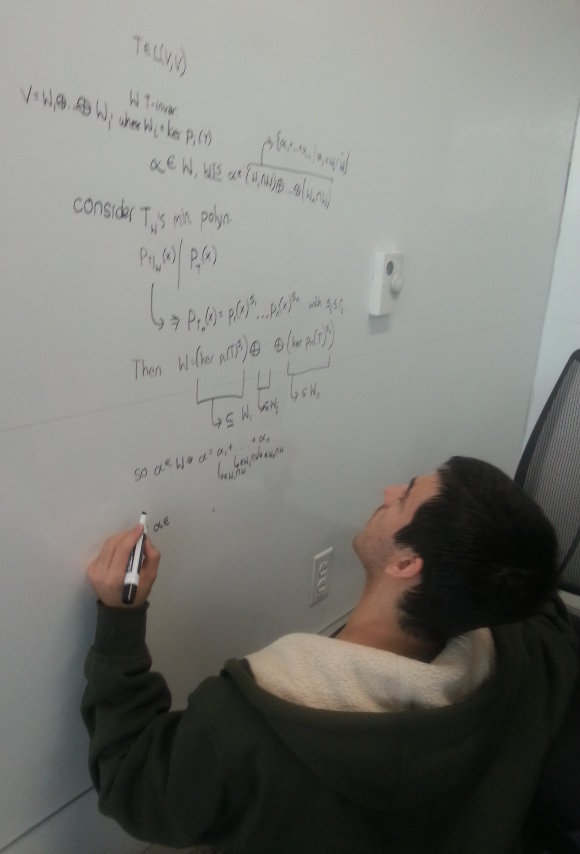
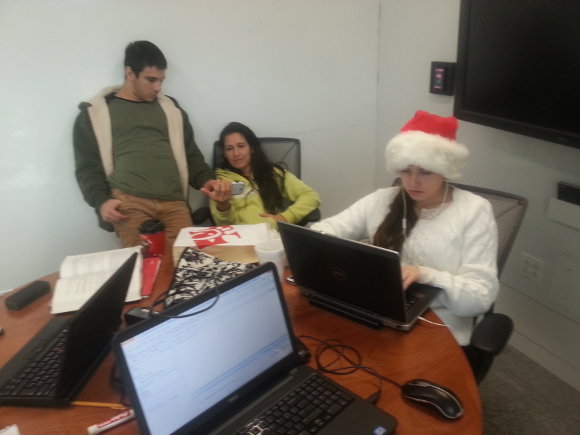
Day 881 of 1000
Answers to Homeschool Questions Series Index
A blog friend, Kendra, has asked a series of questions about how we did our homeschooling with a particular interest in how to use CLEP testing and other tools to skip high school, or at least parts of it. This is the third in the series of questions.
One of the things on which we had agreement with our children was that they could do whatever they wanted in graduate school, but because they were still essentially of high school age during at least the first two years of college, they needed to study something hard. That meant there would be a very strong focus on mathematics. As I have mentioned in other places in the blog, Kelly is in the last semester of a degree in Statistics and Christian is in the last semester of a degree in Applied Mathematics. So, with three months left, Kelly’s grades are currently at the level to graduate Magna Cum Laude while Christian is on schedule to graduate Summa Cum Laude with an honors degree. I only said that to say that the way we did Mathematics in our homeschool appear to have been good preparation for Mathematics intensive degrees. I should note that we got great prices at Sonlight, so we bought these programs there. So here is what we did:
Singapore Math – We started with Saxon Math in elementary school. It worked well for us, but it did not create a lot of excitement with the kids, so I did research over the summer and settled on Singapore Math. We absolutely loved it. It seemed to allow the kids to learn the material faster at the same time it was more interesting to them. We did about a year and a half worth of Singapore Math each year and that did not seem to be an onerous work load for the kids. They still loved the program when we finished it at the end of the (Singapore Math) sixth grade year.
Teaching Textbooks – We tried to use the Singapore Math offering when Kelly finished up the last of the Sixth Grade books. After about a month, we gave up and looked for something else, because it was just not working. I did an investigation, found several options that looked OK and decided to take a chance on what was not a completely mature program at the time, Teaching Textbooks. It was nothing short of awesome. The kids both did Pre-Algebra, Geometry, Algebra I, Algebra II with Teaching Textbooks. We purchased the Pre-Calculus program for Kelly when she got to it, but it was very immature at the time. I have heard that it has been dramatically improved and we probably would not have changed if that program had been better at the time.
Thinkwell Math – When we knew we needed to switch from Teaching Textbooks for Pre-Calculus, I went through another investigation phase and received very good reports about Thinkwell Math. It is an online course that is absolutely excellent. Kelly went through their entire Pre-Calculus program in conjunction with the REA Pre-Calculus CLEP preparation book. She easily passed the Pre-Calculus. Christian got through almost exactly half of that course before he had to take the Community College Mathemetics placement test. That half year was enough to place him into Calculus I where he did well.
Like you, we used Apologia starting with Physical Science and going on to Biology both of which appeared on both Kelly’s and Christian’s high school transcripts. That was the last of their homeschool science. Kelly then spent six months going through the REA Biology CLEP preparation book and was able to pass that test with a fairly high score. Neither Christian nor Kelly had any problem with Biology in college. That being said, Christian had to do some pretty serious preparation to be able to handle Chemistry in college, but his strong Mathematics background made Physics pretty straightforward for him. Kelly did not take Chemistry or Physics in college.
History was a little bit of a problem for us. Kelly brute forced her way through the REA CLEP preparation books to pass four CLEP history tests (Western Civilization 1 & 2 and US History 1 & 2). Christian took Western Civilization 1 and 2 at the community college and did well in them based on the preparation he got in homeschool. We think the Sonlight programs served our children very, very well in this regard with one exception. We think Sonlight’s high school US History program based on the Joy Hakim books is abysmal. We put a US History program together for ourselves that we absolutely loved. I discuss what we did here, here, here, here and here. All this being said, unless your kids are memorization machines, the CLEP History exams can be pretty rough. Kelly is a pretty gifted/disciplined memorizer, but passing all those tests was a chore and Christian really enjoyed his History at the Community College because he got a great teacher.
This does not seem like a bad goal with the cavaet about the History. The REA CLEP preparation books were our friends in passing the tests.
Big State U (in our case North Carolina State University, but I know this to be true about the vast bulk of Univerisities in the country) gives credit but not grades for passed CLEP tests and Community College classes. I know when I started college at Big State U (Oregon State University), I was academically, but not mentally nor social prepared for college, so my grades suffered greatly the first two semesters. I spent my entire Bachelor’s degree trying to make up for those semesters. Our kids did better than me during their first too semesters, but have done dramatically better since then. The upshot is that all one has to do to get the credits for the CLEP test is to get the minimum score accepted by the University. All one has to do to earn credits for the Community College is to get high enough overall grades to get accepted at the University of choice. Anything that is a C or above gets converted to a PASS. The kids get a clean slate GPA-wise when they enter Big State U. That was a very good thing for us.
This is a very good point. If we had this to do over we would have studied for only those CLEP tests the kids did not enjoy, so they did not have to deal with it any more. Because of our errors, we got Kelly into Community College (with a boatload of credits) after her Sophomore year of high school. We would have put her in after her eight grade year with that do-over.
I hope that helps! Loved the questions!
Betty Blonde #47 – 09/19/2008

Click here or on the image to see full size strip.